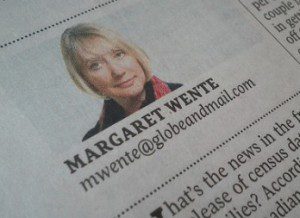
My world of words has been turned upside down this week. One of our own has been accused of the worst sin in our profession – taking the ideas of another writer and presenting them as her own. According to Carol Wainio, an Ottawa-based blogger, in 2009 Globe and Mail columnist Margaret Wente wrote an editorial about something called enviro-romanticism. In her column, among other things, she wrote about non-governmental organizations.
“They believe traditional farming in Africa incorporates indigenous knowledge that shouldn’t be replaced by science-based knowledge introduced from the outside,” Wente wrote.
Wainio contends these words Wente used were almost exactly those written in 2008 by Ottawa Citizen columnist Dan Gardner, but that Wente did not attribute them to Gardner. Wainio, also a University of Ottawa professor, accused Wente of plagiarism. It must be said that Wainio has made a regular practice of cataloguing and complaining about Wente’s columns before. Her blog is called “Media Culpa.” In other words, she has made an Internet career of criticizing other media writers, often Wente. But my question is: When some of the country’s brightest thinkers allegedly steal from others, what’s the state of honesty?
I’ll get to Wente’s column in a second. But let me tell you about a moment I overheard in a parking lot the other day. Two men were talking about their recent shopping trips across the border into the U.S. They were comparing their return trips to Canada. One said he made great time coming home. The other lamented that Canada Customs had stopped him at the border and searched his vehicle.
“They found all the liquor we’d bought,” he said. “We ended up paying more than $100 in liquor taxes.”
I felt like saying, “Serves you right.” But I didn’t. The Customs officer had clearly done his job meting out the appropriate penalty to somebody trying to get away without paying legal tariff.
I wondered where that kind of behaviour comes from? What makes people seek the illegal way out as a kind of badge of courage? What compels some of us to dodge the law or HST without equating that with dishonesty? In a related topic, I do a lot of driving – often parallel to High Occupancy Vehicle lanes – and I always see cars whizzing by in the HOV with just the driver in the car when they clearly don’t have the required two people. I guess they’re playing the odds (like the guy hiding the booze at the border) that there aren’t enough law enforcement people to catch everybody.
Unfortunately, there’s a lot of dishonesty around. We’ve seen it among professional athletes using drugs in their bid to be best. We’ve watched business people misrepresent themselves selling investments, mining gold or airing false advertisements. On Parliament Hill and at Queen’s Park, I wince every time a politician flip-flops on a policy – getting elected and then changing positions. Then there’s the Toronto mayor and his apparent use of telephones, cars, staff and public works in personal causes, not public ones.
But it’s often journalists who get the most notice for dishonesty, because their profession requires that they report, investigate or criticize in the public eye. It’s their job.
In defence of Margaret Wente, let me remind those who want to join her figurative public lynching that she is an accomplished journalist. Born in the U.S., educated in Canada (MA in English at U of T), she has reported, edited and written for the Globe and Mail for more than 25 years. Her editorials are often political. That tends to polarize her readers; in other words, she makes enemies. That doesn’t absolve her of the journalistic requirement of citing her research or attributing her sources. But it does expose her to criticism from political enemies. Wente and I have been writing for about the same length of time and I know some don’t agree with my views either.
Nor is the job of being a journalist what it was when Margaret Wente and I wrote and published our first stories in the 1970s. It’s no longer just a matter of musing about the world and handing our comments to a printer in the press room. Journalists today – and I teach some of them – must also take photographs, record audio, shoot video, write blogs and encapsulate on Twitter and Facebook. It’s not just about writing anymore. The demands are greater. The time is shorter. The risk of mistake or oversight is higher.
“I’m far from perfect,” Margaret Wente wrote in the Globe last week. “I make mistakes. But I’m not a serial plagiarist. What I often am is a target for people who don’t like what I write.”
I’m prepared to criticize my colleague’s error and campaign for better journalism, but let’s deal with dishonesty in the marketplace, the sports arena and at the international border too.